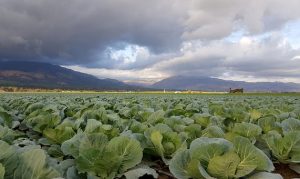Milos Dmitrović-Pajo from the village of Obrva near Morava grows vegetables, among which cabbage plays a dominant role. Although the rain in September brought relief to vegetable growers, the past period of drought and the rise in irrigation costs made production significantly more difficult. In addition to cabbage, Milos grows eggplant, somborka, and pepper, because the variety in the assortment reduces the risk. During this year, he faced challenges such as late frost, hail and high temperatures that reduced the crop. Production was hampered by high costs for fertilizer, pesticides and additional irrigation.
Cabbage, as a dominant crop, requires great dedication. The price is currently around 50 dinars wholesale, but it doubles in stores. This profit allows covering costs for the next season, but prices are not always stable, which carries a risk for producers. In addition, blue eggplant was not so much in demand this year because the demand for ajvar decreased. Milos, although a long-time producer, believes that due to constant price fluctuations and market uncertainty, it is not easy to plan the next production. Prices in stores also affect customers, who increasingly choose processed products or buy vegetables in smaller quantities, which affects demand and thus the profitability of cultivation.
How is cabbage sold, produced and displayed?
In this village, there were earlier initiatives to establish a cooperative that would enable a more organized approach to sales and storage, but without success. The areas under vegetables are decreasing because of the highway and the airport, and younger people are increasingly leaving the countryside in search of work in the city. Also, interest in manual work in agriculture is declining. Milos emphasizes the importance of safe market conditions for producers, which would enable them to have more stable earnings. In the absence of organized sales outlets, manufacturers often depend on buyers and auctions, which can further reduce their earnings.

As for further plans, Milos states that next year he will have to decide whether he will plant cabbage again. After all, he claims, there is no guarantee that demand will be maintained at current levels. More and more often, people are opting for ready-made products instead of home-made winter vegetables, so the sale of peppers and blue eggplants has decreased accordingly. Domestic ajvar, which requires significant investment and work, is often cheaper at sales in stores, which raises doubts about its quality, but also reduces interest in traditional preparation.
Leaving Obrva, the workers diligently picking vegetables praise their host, which is another indicator of his attitude towards work and people. The quality of vegetables largely depends on commitment and effort, and Milos believes that the most important part of agriculture is the trust he builds with workers and customers.
Source: Agropress
Source: boljazemlja.com


